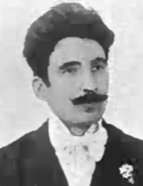

Vale de Açores, Mortágua, 1881 – Parede, Cascais, 1971
José Lopes de Oliveira was born on November 25th, 1881, in Vale de Açores, Mortágua. Of modest social origin, he was the son of João Lopes de Oliveira and Maria Adelaide de Jesus, and was closely accompanied by his godfather, Adelino José Tomás, who was father of the author Tomás da Fonseca. Firm republican, he stood out for his dedication to teaching and for his work as a historian. In 1905, he completed his bachelor’s degree in Law at University of Coimbra. It was still as a student that he published his first works: a collection of three volumes under the title Intelectuaes (the first one was focused on Bernardino Machado, the second one on Camilo Castelo-Branco, and the third one on Fialho de Almeida). He became a Mason the following year, joining the lodge Portugal, in Coimbra, under the symbolic name of “Rousseau”. Shortly after he graduated, he became a teacher of History and Geography in a high school in Viseu, where he remained until 1910. After the implantation of the Republic, he became a teacher in the high school Passos Manuel, in Lisbon, where he taught for several decades. Still in 1910, he became director of the Lisbon Normal Schools, leaving the position in 1911 due to political disagreements. In the political sphere, Lopes de Oliveira praised the republican ideal from an early age, thinking that it would be impossible to enshrine the victory of Democracy within the monarchic regime, because “only the republican form can suit the nation” if the latter wants to live and improve (História da República Portuguesa, 1947, p. 19). In 1908, he was described in the Álbum Republicano as “an admirable champion” of the democratic movement. He was a militant of the Portuguese Republican Party until 1920, occupying the position of staff chief of the Presidency of Ministry led by Bernardino Machado. He then joined the Radical Republican Party in 1923, taking part in its directory. He took over the presidency of the same party in 1925.
